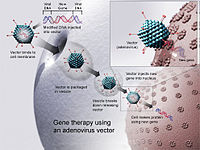
Photo from wikipedia
Samples from patients with rare diseases, such as primary immunodeficiencies, are often limited, which hampers careful analysis of the pathomechanisms involved in immune cell dysregulation. To overcome this issue, induced… Click to show full abstract
Samples from patients with rare diseases, such as primary immunodeficiencies, are often limited, which hampers careful analysis of the pathomechanisms involved in immune cell dysregulation. To overcome this issue, induced pluripotent stem cells (iPSCs) represent an almost inexhaustible cell source and thus provide an excellent opportunity to generate disease models for rare diseases and to validate new therapeutic approaches. To obtain a better understanding of primary immunodeficiencies associated with the IL-10 signaling pathway, e.g., very-early-onset inflammatory bowel disease (VEO-IBD), we generated genetic knock-outs of IL-10RA and IL-10RB as well as the downstream targets of the IL-10-receptor (IL-10R) STAT1 and STAT3 via a sgRNA-CRISPR-Cas9-expressing lentiviral system. IL-10 signaling-associated knock-out models and a VEO-IBD patient-derived iPSC clone were differentiated into macrophages for disease models. IL-10R- or STAT3-deficient disease models showed no IL-10 induced BCL3 or SOCS3 expression, whereas LPS-stimulation induced IL-10R independently BCL3 and SOCS3 expression. Cytokine secretion profiles from iPSC-derived macrophage disease models showed that IL-10 was involved in many inflammatory cytokine secretions, which indicated formation of both anti- and pro-inflammatory macrophage phenotypes. Macrophage-secreted cytokines were separated into IL-10R- and STAT3-dependent (IL-6, TNF-α), or into IL-10R-, STAT1- and STAT3-dependent cytokines (CCL2, CXCL10). Importantly, lentiviral correction restored IL-10-mediated regulation of LPS-induced cytokine secretion in corrected IL-10RB, STAT1, and VEO-IBD patient-derived disease models. Furthermore, treatment of IL-10RB-deficient macrophages with anti-inflammatory small molecules (SB202190, Filgotinib) reduced pro-inflammatory cytokine secretion patterns. Taken together, the described iPSC knock-out models gave new insights into the pathomechanisms of immune cell dysregulation and served as model systems to test potential therapeutic approaches, including lentiviral gene therapy and targeted small molecule treatment.
Journal Title: Human gene therapy
Year Published: 2020
Link to full text (if available)
Share on Social Media: Sign Up to like & get
recommendations!